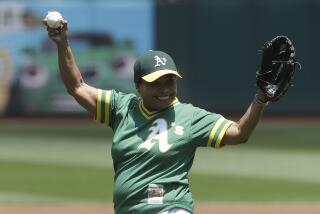Capital’s Back in the Old Ballgame
- Share via
WASHINGTON — District of Columbia officials moved Tuesday to salvage an agreement to bring baseball back to the nation’s capital, after a tense week that had subjected them to ridicule and exposed regional fault lines between sports fans and city voters wary of the deal’s price tag.
By a 7-6 vote, the City Council approved a proposal to fund a $500-million stadium on Washington’s Anacostia River waterfront, the linchpin in Major League Baseball’s plan to move the Montreal Expos here.
Tuesday’s deal guaranteed that the ballpark -- future home to the reborn Washington Nationals -- would be publicly financed. But it also included a commitment to search for private funding, a condition that last week almost scuttled baseball’s return to a city bereft of a team since the Washington Senators departed for Texas in 1971.
“There’s nothing else that can go wrong,” said William Hall, a member of the capital’s Sports and Entertainment Commission. “This is it; we’ve done it.”
For the past week, baseball’s supporters and detractors here had been locked in a frenzy of recrimination. Suburbanites who pined for baseball’s return heaped scorn on quarreling political leaders. D.C. residents hostile to spiraling stadium costs blamed baseball officials.
During the free-for-all, e-mail lobbying grew ugly and sports columnists dueled acidly. One blog compared politicians and baseball executives to warring behemoths in a Japanese monster movie.
“The city should be embarrassed by the way it’s handled the situation,” said Virginia resident John Viega, one of several newly passionate National fans who have been skewering the decision-makers in Internet broadsides.
A tentative agreement between the city and baseball executives unraveled last week, when council Chairwoman Linda W. Cropp backed away from her support of a new stadium to be funded through a gross receipts tax on businesses and a utility tax on federal and commercial offices.
Cropp wanted assurances that the city wouldn’t be subject to financial penalties if the proposed 41,000-seat facility ran into delays. Insisting she was willing to see the deal die, Cropp also pressed for a guarantee that the city would seek private financing. Her pivot prompted threats from baseball executives to move the Expos elsewhere.
But on Tuesday, Cropp reversed herself again after a series of meetings with Mayor Anthony A. Williams. Cropp said she had been placated by Williams’ efforts to drum up private financing and by an assent from baseball officials that the city’s liability would be lessened from $19 million to $5 million if the stadium were not ready by the start of the 2008 season.
“I’m pleased we were able to talk and negotiate through some very important details,” Cropp said. Williams agreed, even before Cropp had cast her vote. “It’s going to be great for the city, economically, socially and every way,” he said.
Sports teams in recent years have faced resentment from municipalities forced to shoulder the burden of erecting mammoth stadiums.
“No community has that much excess capital that it can afford $400 million for a new stadium without taking a real hard look,” said Robert A. Baade, an economics professor at Lake Forest College near Chicago.
When Mayor Williams and major league officials in September unveiled the plan to move the Expos into the proposed riverfront stadium, fans in Washington were euphoric. Red baseball hats with curved Ws -- a variation on the old Senator caps -- were suddenly fashionable. More than 15,000 season ticket applications flooded in.
But high hopes were deflated last week by Cropp’s change of heart. Williams continued to insist that most Washingtonians backed his stadium plans. But several public opinion polls showed residents were evenly divided over the issue.
Opposition is widespread in the stretch of row houses, junkyards and scrap metal factories that would be razed for the new stadium. “It may bring new jobs, but it’s only gonna hurt the people around here,” said John Walker, a scavenger who hauls scrap iron to local smelters.
But Cropp bore the brunt of public scorn elsewhere in the district. A lobbying campaign to pressure her to change her mind spurred hundreds of e-mail missives, including some that friends described as openly racist and sexist.
Washington Post sports columnist Thomas Boswell accused Cropp of a “bait-and-switch,” while his colleague Sally Jenkins insisted that Cropp had posed “sensible questions” to baseball’s “extortionists.”
“I certainly have been bent in this process,” Cropp said, “but I have not been broken.”
Baseball also alienated fans by abruptly shutting down a new Washington Nationals merchandise store. City officials said Tuesday that trucks loaded with team products would return to the shuttered store at Washington’s RFK Stadium, where the transplanted Expos are scheduled to play next year.
But the agreement and the prospect of baseball in the district has not erased fans’ ill will.
“Ballwonk,” one of a handful of bloggers, had posted a series of graphics that grafted Cropp’s head onto the body of Godzilla -- and the head of Major League Baseball President Robert DuPuy onto the body of Rodan, another winged Japanese monster.
“It’s pretty funny stuff,” Viega said, “but what’s behind it is that we’re all pretty disgusted with all of them.”
More to Read
Go beyond the scoreboard
Get the latest on L.A.'s teams in the daily Sports Report newsletter.
You may occasionally receive promotional content from the Los Angeles Times.










